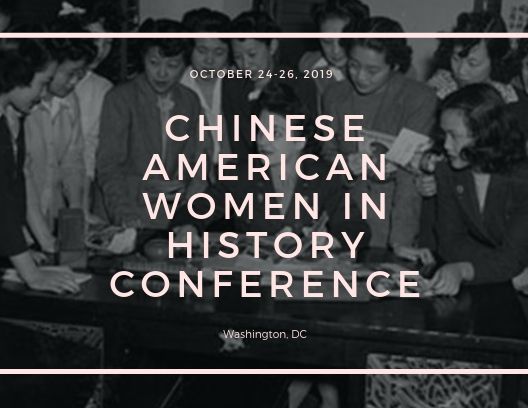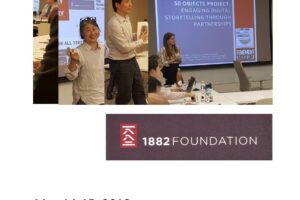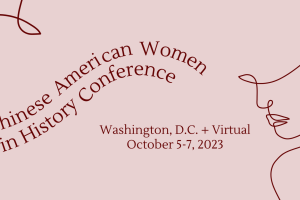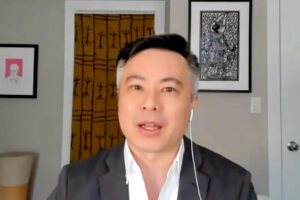A unit of Chinese American women, known as “Air WACs,” recruited to serve with the Army Air Forces in World War II.

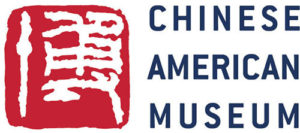
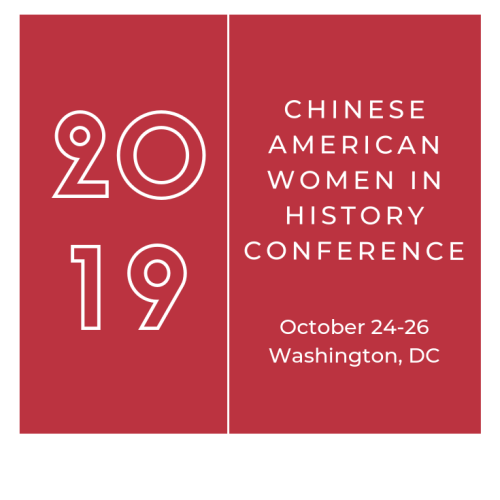
The 1882 Foundation and the Chinese American Museum DC present a conference on Chinese American Women in History (CAWH), exploring a century of experiences framed by the enactment of the 1875 Page Act, that targeted Chinese women for exclusion from the US, and the 1965 Hart-Celler Act, landmark immigration reform that finally enabled migration of Chinese spouses and families.
The conference will be held in Washington, DC, October 24-26, 2019 at three convenient locations in a 2-block radius: the Chinese American Museum, the historic Charles Sumner School Museum and Archives, and University of California Washington Center. The conference will include scholarly panels, community storytelling, and film screenings that feature the pioneering work of Chinese American women filmmakers.
The conference is open to anyone interested in the topic whether as professional scholars or for personal curiosity. For more information and registration for all programs ($50 per person), click the registration link above.
The agenda below is subject to change. Please don’t hesitate to reach out to womensconference@1882foundation.org with any questions or concerns!
Day 1: Presentations (1875-1965)
October 25, 2019
9:00am - 5:00pm
Charles Sumner School Museum & Archives
1201 17th St NW, Washington, DC 20036
9:00am Breakfast and Arrivals
9:30am Welcome and Opening Remarks
10:00am – Panel 1 – The Activist: Dr. Mabel Ping-Hua Lee: This panel focuses on Dr. Mabel Ping-Hua Lee, a suffragist and the first Chinese immigrant woman in the U.S. to receive a PhD in Economics (Columbia University)—elaborating on her community activism, scholarship, feminism, and religious leadership in New York Chinatown at the turn of the 20th century. Rev. Bayer Lee of the First Chinese Baptist Church (founded by Mabel Lee’s father) shares his research on sites significant to Mabel’s legacy. Dr. Megan Springate, National Park Service, reports on the agency’s preparations for the 2020 commemoration of the 100th anniversary of the 19th Amendment, which will include Mabel Lee’s contributions to the cause. Melanie Chan, national president of the Chinese American Citizens Alliance (the oldest Asian American civil rights organization in the country), offers perspectives on Mabel Lee’s legacy and impact on women’s leadership in the Chinese American community today.
11:00am – Panel 2 — The Artist: Anna May Wong: This panel focuses on Anna May Wong, a pioneering Chinese American actress whose career spanned the silent film era to 1950s television. Drawing from academic, artistic, and public perspectives, Dr. Shirley Jennifer Lim, associate professor of history at Stonybrook University and author of Anna May Wong: Performing the Modern (Temple University Press, 2019), provides historical context to Anna May Wong’s work and describes her impact on images of Chinese American woman. Poet/writer Sally Wen Mao adds from her recent poetry collection Oculus (Graywolf Press, 2019) to explore the racial and gendered tensions of Anna May Wong’s career. The panel concludes with a discussion of a recent public engagement project by the National Postal Museum, featuring portraits of Anna May Wong and excerpts of Sally Wen Mao’s poetry.
Policy Track:
12:30pm – Track A-1 – Immigration and Social Adaptation: The War Brides Act: The 1945 War Brides Act allowed for the immigration of foreign-born spouses of US servicemen despite the severely restrictive quotas of the time. Dr. Vivian Louie, director of the Asian American Studies Center at Hunter College, addresses the social and historical background of this major legal break in the Chinese exclusion laws and transformational impact this cohort of women had on post-World War II Chinese American community life. Jenny Chan, co-founder of Pacific Atrocities Education, explores how this legislation was presented in US Chinese-language press. The panel is moderated by Dr. Janelle Wong, professor of American Studies at University of Maryland, whose research has examined the legacy of war brides on US immigration policy and Chinese American heritage and culture.
2:00pm – Track A-2 – Personal Reflections Post WWII: This conversation features: Aryani Ong, activist and Six Hues “blogvocate”; Susan Yu, whose mother was among the first 105 Chinese emigres who were allowed to enter the US after the repeal of the Chinese Exclusion Acts; Henry Lee, whose mother was a War Bride; and Ginny Gong, community activist/TV host of East Meets West. The panelists share stories of women immigrants who transformed the heretofore bachelor Chinese American society of the pre-1940s and became the keepers of culture and family traditions through the 1950s and before the social transformations that followed the passage of the 1965 Immigration and Nationality Act.
Communities Track:
12:30pm – Track B-1 – Geography and Cultural Preservation: Chinese American Women in the South: This session focuses on Katherine Wong, the mother behind the Supreme Court case of Gong Lum v. Rice, which challenged segregated schools in Mississippi 30 years before Brown v. Board of Education. Panelists include journalist Adrienne Berard, author of Water Tossing Boulders: How a Family of Chinese Immigrants Led the First Fight to Desegregate Schools in the Jim Crow South (Beacon Press, 2016); actor/director/talk show host Crystal Kwok, who directed the documentary film project Chinese Women in the Segregated South; and Regina Chow McPhie, retired EEO officer of FEMA’s DC office. The panel is moderated by Rachel Lee of the Antiracist Research & Policy Center at American University.
2:00pm – Track B-2 – Women as Cultural Carriers in Rural Chinatowns: This session brings attention to Chinese Americans in rural communities through an interdisciplinary conversation featuring Dr. Sue Fawn Chung, professor emerita of history at the University of Nevada, Las Vegas, and author of Chinese in the Woods: Logging and Lumbering in the American West and In Pursuit of Gold: Chinese American Miners and Merchants in the American West, and Evelyn Hang Yin, a MFA student at the California Institute of the Arts, who has been documenting images and oral histories of the Hanford Chinese American community in California’s San Joaquin Valley and the preservation of its Chinatown.
3:15pm – Panel 3 – Approaches to History and Behind the Storytelling: Day’s Wrap Up and Look Ahead: In the process of wrapping up and summarizing the day’s events, this closing session for the day encourages a discussion on perspectives and approaches to the historical narrative and about different approaches and methodology in film, literature, and visual arts. What messages do we seek to convey and to ensure they are distinct, if they indeed should be distinct? What are the stories behind the drive to tell stories? Led by Dr. Sojin Kim of the Smithsonian Center for Folklife and Cultural Heritage.
4:00pm Closing. Followed by Transition to “Meet the Producers” event with Robin Lung and Greg Mark at the Chinese American Museum, DC.
Film Screening & Discussion
October 25, 2019
6:00pm - 8:30pm
University of California, Washington Center
1608 Rhode Island Ave NW, Washington, DC 20036
The evening of Friday, October 25, we are also hosting a public screening of Finding Kukan (2016) with filmmaker Robin Lung, and The Curse of Quon Gwon (1916) by Marion E. Wong, represented by her grandnephew Greg Mark.
Day 2: Community Conversations
October 26, 2019
9:00am - 4:00pm
University of California, Washington Center
1608 Rhode Island Ave NW, Washington, DC 20036
9:00am Breakfast and Welcome
9:30am Opening Remarks
9:45am – Film Discussion – This session explores the significance of Finding Kukan and the Curse of Quon Gwon with filmmaker Robin Lung, Asian American studies scholar Greg Mark, and filmmaker Alexandra Hsu. The conversation is introduced and moderated by Jenny Cho, board member of the Chinese American Historical Society of Southern California and author of Chinatown Los Angeles and Chinese in Hollywood (Arcadia, Images of America series).
10:45am – Writers Panel – This panel shares insights on researching, telling and publishing family stories in written formats. It features authors Veronica Li (Confucius Says and Journey Across the Four Seas), Leslie Li (Just Us Girls, Bittersweet, and Daughter of Heaven: A Memoir with Earthly Recipes) and Lily Liu (Parting). The session will be moderated by Stan Lou of 1882 Foundation.
11:30am – Community Writers Workshop –
In this session, we will break out into small groups for hands-on review, discussion and sharing of essays submitted by the audience/community. It will be moderated by 1882 Foundation Associates, May Cheh and Stan Lou. Do you have memories to share about growing up Chinese American? Do you have stories from family and friends that you can relate about the immigrant experience or about cultural conflict? Please submit one, two or three (double-spaced) pages of fiction or non-fiction writing samples to womensconference@1882foundation.org You will receive feedback from other participants and from our panel of expert writers.
Lunch – The lunch period will include a corner where authors’ and producers’ can display their work and exchange ideas informally.
1:30- 2:30pm Telling Stories, Talking History – Public education through storytelling, blogging, stage and animation, and other creative approaches to lectures and public presentation with Stan Lou (1882 Foundation, Talk Story), Keith Chow (Nerds of Color), Ruth Tam (WAMU), and Sue Fawn Chung (University of Nevada, Las Vegas, history department).
2:30 – 3:30pm – Community Open Mic – “Stories My Mother Told Me,” or “Me About Her.”
As individuals or in pairs, people are invited to step up and tell a story –five minutes, no props, no images, no power points. Register for a time slot ahead of time, or just step up to the open mic. Introduced and guided by Keith Chow, author, editor and pod cast host (The Nerds of Color, Asian American Comics Anthologies, Hard NOC Life, Southern Fried Asian, DC TV Classics.) To be recorded and live streamed.
3:30pm – Conference Closing
Participants are encouraged to submit writings and open mic ideas to womensconference@1882foundation.org. Please submit a maximum of 3 pages, 12 point font, double spaced. If your work is longer than 3 pages, please submit an excerpt. We will include your story in our post-conference proceedings unless you opt out.

